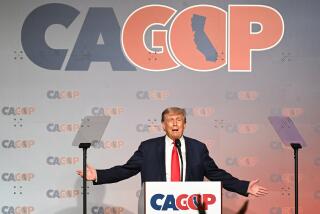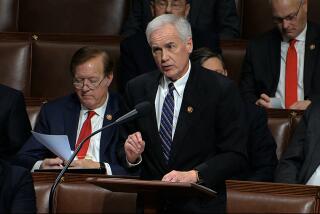GOP Says It’s Now Time for Policy Battles
- Share via
WASHINGTON — Senate GOP leaders conceded Friday that their party has taken some hits in the impeachment battle but said that they intend to put the ordeal behind them and quickly produce a “positive agenda.”
Led by Senate Majority Leader Trent Lott (R-Miss.), Republicans also defended their conduct during the impeachment trial, saying that they have nothing for which to apologize or to regret.
“We had a constitutional duty to carry out. I think we did it in a fair way,” Lott said after President Clinton was acquitted on two articles of impeachment.
“I think the Republicans in the Senate and all over the country can be proud of what we did,” added Sen. Larry E. Craig (R-Idaho), the third-ranking Senate Republican.
“It was a job that had to be done,” a subdued Sen. John W. Warner (R-Va.) said.
But having failed to remove Clinton from office, Senate Majority Whip Don Nickles (R-Okla.) said, Republicans are “willing to put it behind us now.”
In their haste to move on, however, Senate Republicans also foreshadowed in their rhetoric the many policy battles that loom on an array of issues, from tax cuts to Social Security reform.
And hardly unmindful of the 2000 election campaign that is all but underway, Nickles stressed with relish the GOP’s differences with Democrats and the White House on such matters.
“I like that philosophical divide,” he said in an interview. “There’s going to be a good philosophical debate.”
In the impeachment vote tally, five moderate Republicans, all from the Northeast, joined all 45 Senate Democrats to acquit Clinton on the obstruction of justice charge.
They were John H. Chafee of Rhode Issland, Susan Collins of Maine, James M. Jeffords of Vermont, Olympia J. Snowe of Maine and Arlen Specter of Pennsylvania.
They were joined by five other, far more conservative, Republicans in voting to acquit Clinton on the perjury allegation. The other five: Slade Gorton of Washington, Richard C. Shelby of Alabama, Ted Stevens of Alaska, Fred Thompson of Tennessee and Warner.
Warner said he did not believe that House GOP prosecutors had proved their case against Clinton on the perjury charge “beyond a reasonable doubt,” the standard that he personally had chosen to apply in the case.
The others who voted to acquit the president also said that their votes were grounded in substantive legal reasoning.
Although she lost a fair amount of sleep while deliberating how to vote, Collins said that she was “very comfortable with my vote.”
She said that she was especially troubled by the “very strong” evidence that Clinton had obstructed justice. But ultimately, she decided that it did not amount to an impeachable offense.
“It was a decision that I anguished over--a very difficult decision to make. But in the end I believe that I did the right thing.”
That same belief was pervasive among Republicans no matter which way they voted.
“I’m convinced beyond a reasonable doubt that I did the right thing,” said Sen. Rick Santorum (R-Pa.).
Some GOP senators were uncertain about their future dealings with the president.
“You can’t deny that this process occurred. You can’t deny that a number of senators went on the record saying that this president should be removed from office,” said Sen. Charles Hagel (R-Neb.).
“But I think that we have men and women not only of goodwill but who are responsible, and they will rise above this. We all know we have to tend to the nation’s business, and we are all responsible for governing and doing what’s right for this country. And I think we’ll do that.”
Craig said he is not worried that Republicans will suffer in the elections of 2000, even though poll after poll has shown for the last year that the vast majority of Americans did not want Clinton impeached or removed from office.
“Now it’s our job to get on with the people’s business--an agenda that the public needs addressed: from tax cuts to Social Security reform, to dealing with drugs and crime in the streets, education.
“And if we do that, and we do that well, my guess is you’re going to see a substantial change in those poll numbers in a month, or two, or three,” Craig said.
From the other side of the Capitol, House Speaker J. Dennis Hastert (R-Ill.) issued a statement concurring with Senate Republicans on the need to “move this nation forward.”
Craig, however, sounded a combative note. “If the White House will work with us, fine. If not, we’ll obviously have to go our way in dealing with these critical issues.”
And if the differences cannot be resolved, Lott added, “we’ll go to the people and point out the differences . . . and let the people vote on that.”
A few Republicans sounded bitter in defeat.
Sen. Robert C. Smith of New Hampshire said of Clinton: “He won. He won. He always wins. But that doesn’t mean America won, and it doesn’t mean that the rule of law won and that the presidency won. But he won. He always wins. . . . All we can do now is let the judgment of history fall upon us.”
Lott was more upbeat.
“I think we finished the race in a positive way. And I think we kept the faith to our constitutional duty. We handled it in a way that we can be proud of.”
*
* COMING SUNDAY: In Sunday’s Opinion section, Ann Douglas wonders if Bill Clinton had a cultural advantage over his accusers. And Kevin Phillips asks if Clinton will throw the GOP a lifeline.
* ON THE WEB: The Times coverage of the Clinton scandal, from the initial reports of the Monica S. Lewinsky affair through the impeachment trial in the Senate, is available on the internet: https://www.latimes.com
More to Read
Sign up for Essential California
The most important California stories and recommendations in your inbox every morning.
You may occasionally receive promotional content from the Los Angeles Times.













